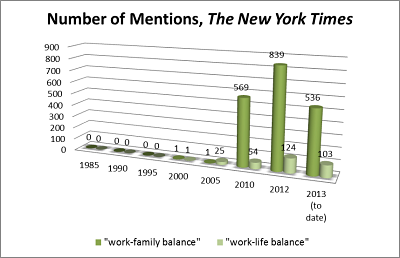Is it only my imagination, or is every month starting to feel like National Work and Family Month?
Sometime in the last year or so, I began noticing that people no longer give me blank stares when I say a lot of my work revolves around "work-life balance." (Yes -- balance. I know it's not the most accurate phrase but, face it, people understand it.) I stopped shouting at my family to "just shut up a minute" when a story about workplace flexibility launched on the radio. My husband no longer pointed out every article he came across that mentioned work and family.
As a nation, we're suddenly talking about leaning in and opting-out. We're discussing paternity leave in the same breath as Major League Baseball. We're listening to CEOs, politicians and pundits weigh in on the topic. In short, the concept of work-life balance, fit or navigation -- whatever name it's going by today -- has spilled out way beyond certain trade journals and arcane professional conferences and into the vaulted halls of the mainstream media. Suddenly, it seems there is a new story about a family-friendly company or frustrated employee every other day.
To test this theory, I did some Internet searching. (This might be a good time to point out that I have no actual training in statistics, and everything I'm about to say is probably suspect, especially to those who do.) Nonetheless... while a search for "work-family balance" yielded only 158 results on Google News, "work-life balance" brought in a whopping 12,200. ("Family-friendly" tipped the scales right down to China with 60,200, but since that phrase can refer to everything from workplace flexibility to cheeseburger joints, I decided not to count it.)
Next, I looked at some of my own favorite general news sites. Sure enough, those two phrases showed up 3,090 and 5,110 times, respectively, in the online archives of The New York Times. A search of Atlantic.com found 2,360 entries for the phrase "work-family balance " and 2,990 entries for "work-life balance." CNN.com gave us only 4 mentions of "work-family balance," but 93 of "work-life balance," while NPR weighed in at 15 and 84, respectively.
(Interestingly, the phrases generally showed up a lot less in media to the right of the political spectrum. Search the online pages of The Wall Street Journal, Commentary, and the Weekly Standard for "work-family balance" and you'll find a total of- - let me see -- zero mentions. "Work-life balance" fares a little better, with 36, 1 and 3 mentions, respectively. But before you draw any conclusions from this, note that "work-life balance" is rare as a Northern Hairy-Nosed Wombat and "work-family balance" non-existent in the web archives of left-leaning MSNBC, whereas together they make a respectable showing of many dozens of mentions on the Fox News site.)
Of course, searching the archives for these phrases gives us no sense of whether their prevalence has changed over time and, unfortunately, very few of these websites allow for time-delineated searches. The exception is The New York Times, which allows for searches within specific dates. So, I took a look at that. I decided to look at discreet years, beginning in 1985, not long after pioneering work-life consulting firm, WFD, was founded. Here's what I found:

Bingo. Nearly two decades of no mention at all, followed by a sudden deluge of appearances, in what looks like it could be an upward trend.
So, maybe it's true. Maybe every month really is National Work and Family Month -- if what we're talking about is awareness. But unfortunately, awareness is just part of the picture. The goal of NWFM, according to its founding organization, World at Work, is:
to encourage employers to think strategically about family-friendly policies and work-life benefits such as workplace flexibility, health and wellness, dependent care, community involvement, organizational culture, financial security, and paid and unpaid time off to attract, motivate and retain a talented workforce.
Hmmm... how many employers are actually doing that? And beyond that, what about public policy? How much have the goals of National Work and Family Month made a dent there?
- We still have no mandated paid parental leave, and smaller companies don't have to require any job-guaranteed leave at all.
- We don't even have mandated paid vacation time.
- Child care, when it is available at all, can still cost more than college.
- Men still face rampant discrimination when they try to care for their families ; women still suffer a lifelong wage gap when they do.
- Health care -- well, let's not even go there right now.
So, yes, we still have a long way to go before we can put conversations about work and family to rest, once and for all. But at least we are finally having the conversations. My small, probably completely unscientific, foray into internet research proved more than just an entertaining exercise. It showed, at least, that the question of work-life has moved from invisibility toward something like prominence. While the phrase hasn't yet made it into the dictionaries (I know; I checked), the concept is out there being talked about and taken seriously.
Think about that, next time you're watching Mad Men. Times really have changed. It's National Work and Family Year.
Robin Hardman is a writer and work-life expert who works with companies to put together the best possible "great place to work" competition entries and creates compelling, easy-to-read benefits, HR and general-topic employee communications. Check out her website for more information and sign up to follow her award-winning blog about writing and work-life.
